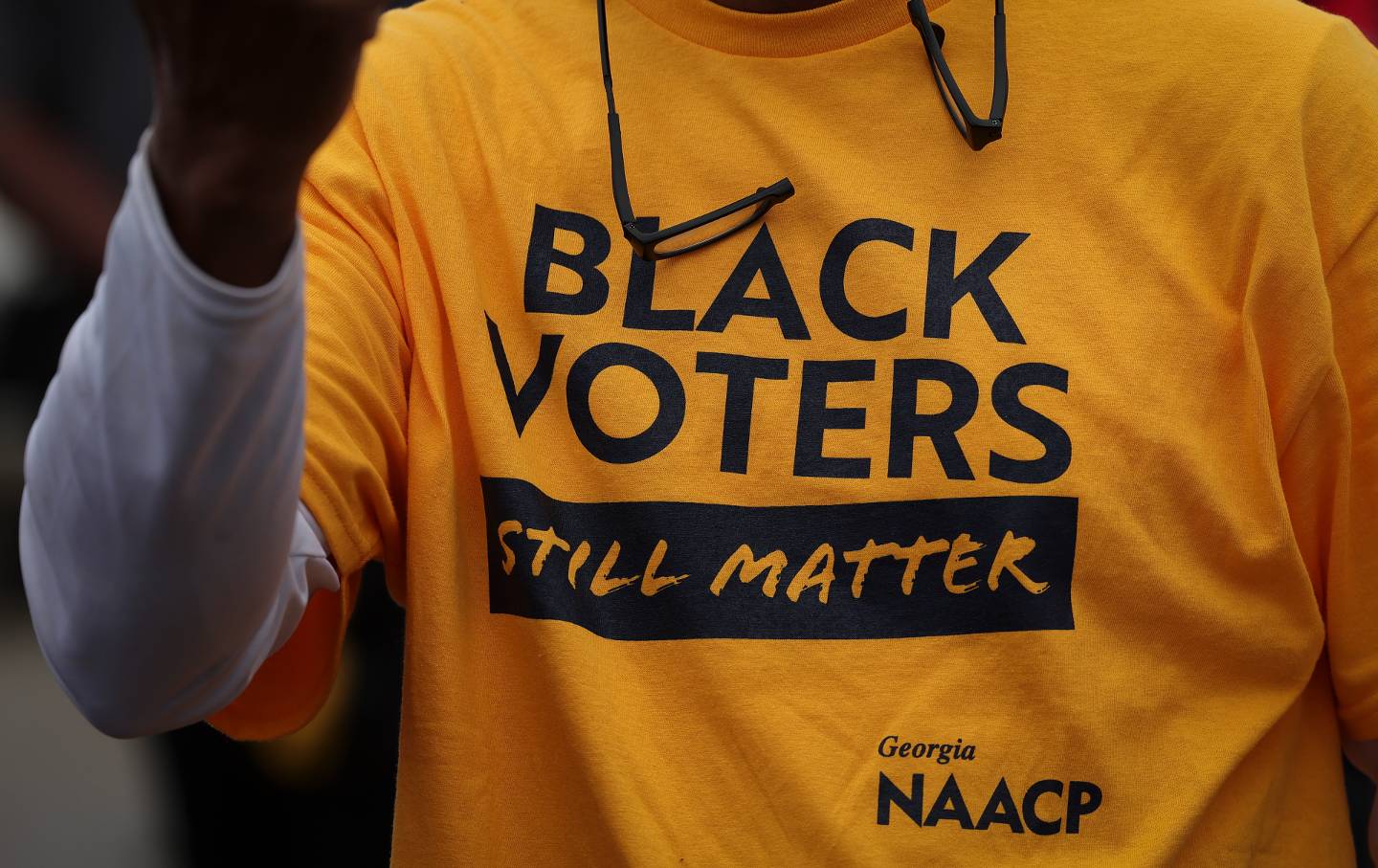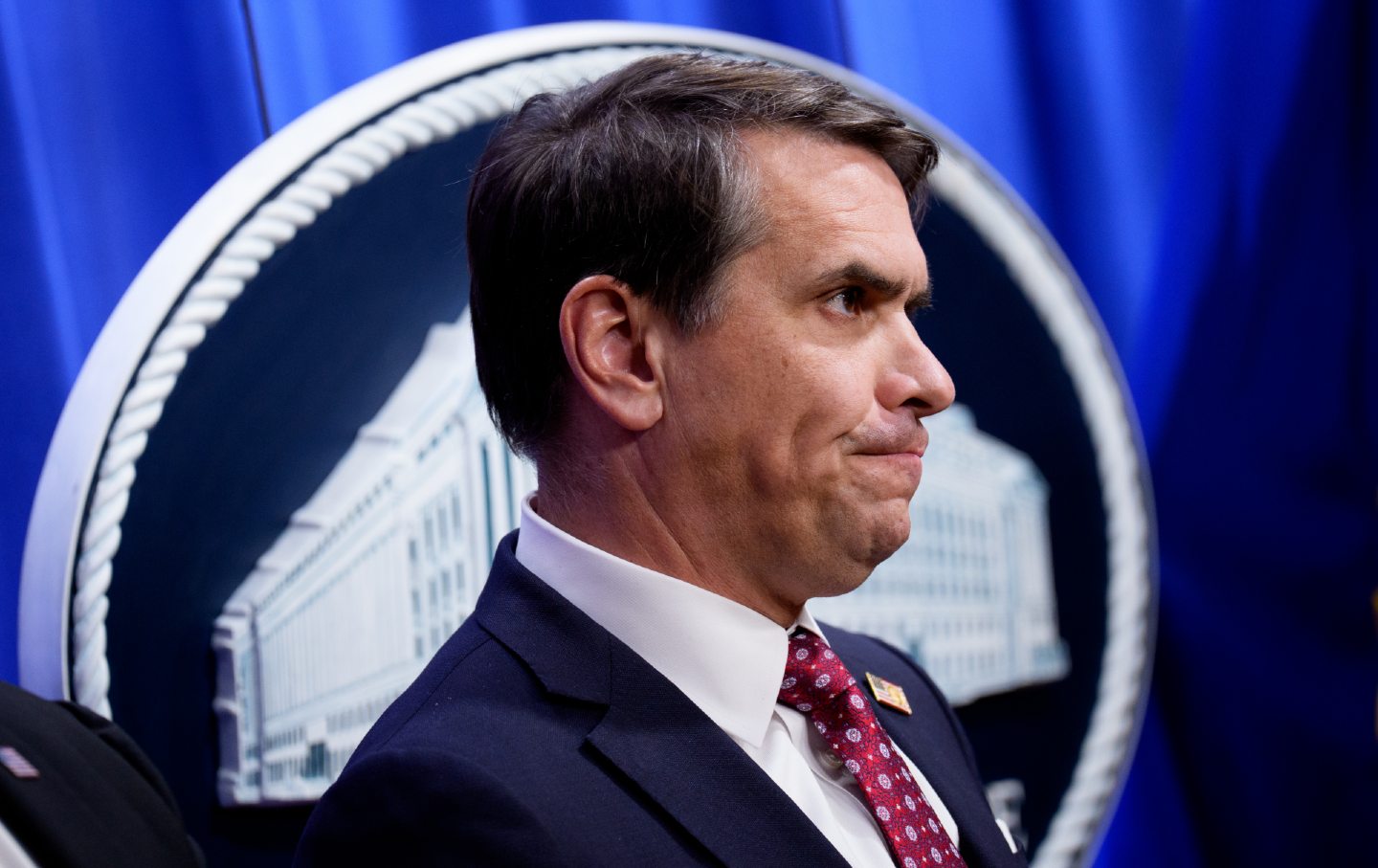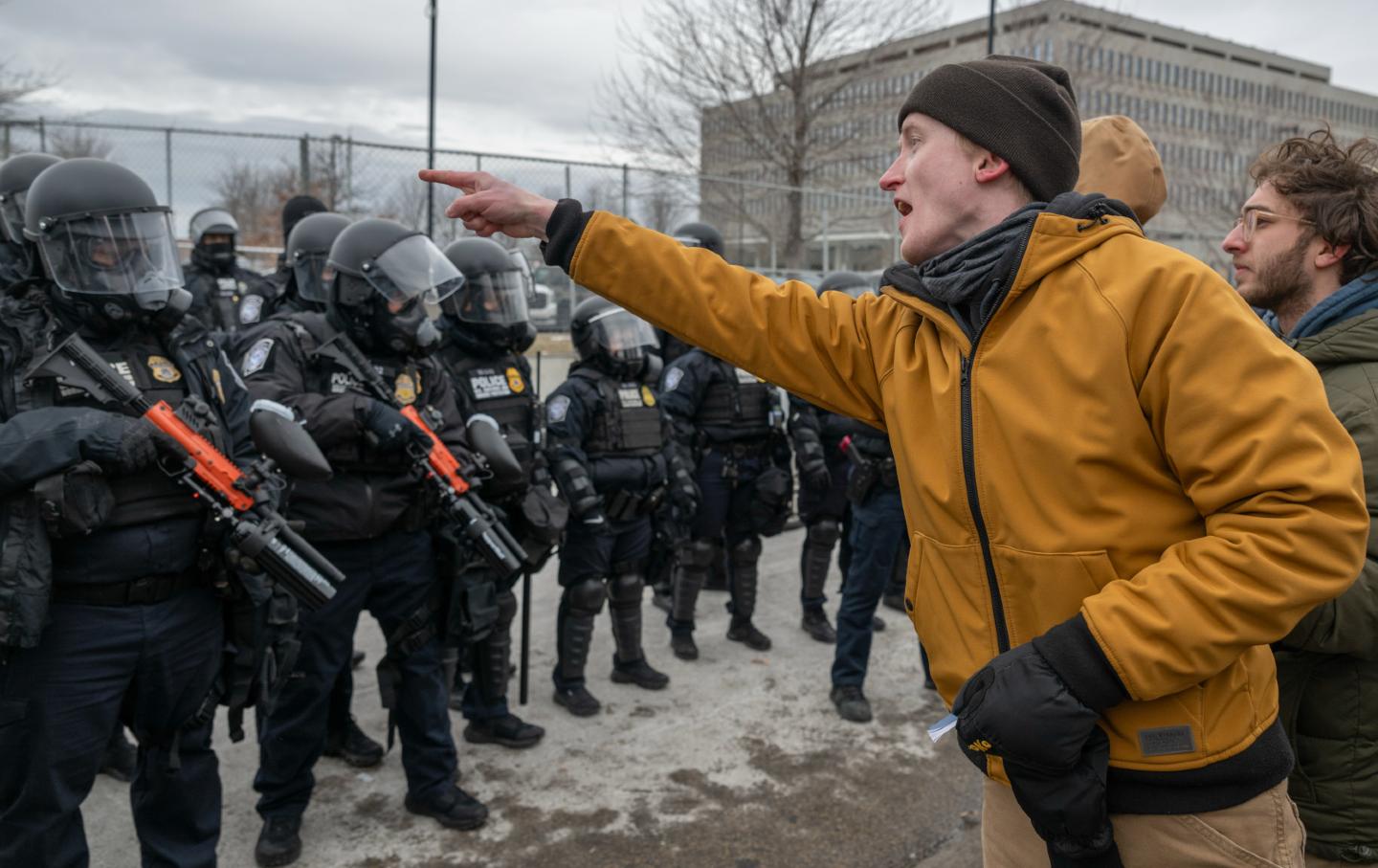On the Ground in Georgia, Organizers Fight to Eke Out a Win
Local Democrats are feeling more isolated than they have in previous election cycles, and voters are harder to reach. Why?

A Georgia voter in 2022.
(Win McNamee / Getty Images)
An astonishing 762,000 brand-new voters—people who had never voted before—had already cast ballots in Georgia one day before the end of early voting Friday. Those votes keep veteran Georgia voter organizer Nsé Ufot awake at night. “They’re certainly some new, young voters who recently turned 18, but that’s not all it is,” she told me. Even though Donald Trump has discouraged his acolytes from voting early or with absentee ballots, state GOP officials have encouraged these practices, so this group almost certainly includes some Trump supporters, she believes. Still, nobody is sure. On balance, Ufot thinks the huge turnout of first-time voters is good news for Democrats. And since, as you recall, Trump begged state officials to break the law and “find” him the measly “11,780” votes that separated him from Joe Biden in 2020, 762,000 new voters could be great news.
But Georgia is getting a little tired of saving democracy for us. Voters there helped elect Biden and two Democratic senators, Jon Ossoff and the Rev. Raphael Warnock, in 2020, and reelected Warnock (after his initial special-election win), giving the party an outright Senate victory in 2022. But many voters here are worn out. There is neither a governor nor a senator on the ballot, so big Democratic donors and organizations aren’t investing in the local groups that drive turnout at the same level. Grassroots organizers feel more isolated.
“People are burnt out here. We hear negativity all the time,” says Essence Johnson, chair of the powerful Cobb County Democrats. She stood loyally alongside Biden in Cobb County the day after his disastrous June debate, and in texts with me she railed at the media for exaggerating his evident aging while ignoring Trump’s. (I sympathized.) But when Kamala Harris became the nominee, Johnson was jubilant—as not only a Black woman but also an organizer who could see a jump in her community’s excitement. That excitement has subsided some, but it’s up to people like Johnson to bring it back. And she’s doing her best.
“It’s day to day with me,” she chuckles. The earliest early voting data came in from red counties, making Democrats worry that their longtime advantage in early voting was evaporating. (Voters are not identified as Democrats or Republicans in these reports, so analysts rely on county and precinct data to make reasoned estimates of which party is doing best.) Most recently, the data is coming from blue counties and precincts, and Johnson and others are feeling more optimistic. An astonishing 50 percent of Johnson’s Cobb County voters had already cast ballots on Wednesday, with two days left.
Maybe the best news is that, so far, those early voters are 56 percent female and 44 percent male. That’s why everyone I talked to working on the ground in Georgia had the same bottom line: They’re worried, and they don’t have the resources they had two or four years ago, but they still think Democrats could pull it out, because they won’t bet against their voters. Especially women.
“People out here are discouraged, especially young black men,” says Dontaye Carter, chair of the North Fulton County Democrats and a vice president of the Atlanta NAACP. “Everybody saw Trump do so much stuff on his own—bad stuff, his Muslim ban, clearing out those Black Lives Matter protesters [in Lafayette Park], building the wall. They thought Biden could do the same.” (Of course, when Biden flexed a little executive order muscle, as in forgiving student loan debt, the Supreme Court reversed him.)
Carter reminds me that the powerful activism of the spring, summer, and fall of 2020 was ignited, in Georgia and elsewhere, by anger over George Floyd’s murder by police officer Derek Chauvin, and faith that Biden and Harris would move on criminal justice reform. But the Biden administration has yet to reach settlements in 12 Justice Department investigations into police wrongdoing, while the president has promised to spend more, not less, on cops. Likewise, the John Lewis Voting Rights Act, named for the patron saint of the voting rights movement who represented Atlanta, and championed by two-time Georgia gubernatorial candidate Stacey Abrams, stalled because two nominal Democrats, Senators Joe Manchin and Kyrsten Sinema, refused to change the filibuster rules to allow a straight majority vote on the bill.
Carter, who ran unsuccessfully for mayor of Sandy Springs in 2021, says he tells potential voters all of that. He also explains all kinds of Biden policies and Harris promises—from forgiving some student loan debt to helping first-time homebuyers to tax credits for starting small businesses. But many still don’t feel it. He tells me something Democrats don’t refute enough: Because Trump put his name on the first Covid relief checks—passed mainly by Democrats—some Black voters believe the money came from Trump. Perhaps even personally.
“Rent has gone through the roof here,” Carter notes. The gentrification of Atlanta has had a somewhat under-covered consequence: “You know those ‘suburban districts’ everyone sees going for Democrats?” The ones known as “white suburban districts”? I answer. “Yeah. They’re increasingly Black and multiracial.” But formerly Republican white suburbanites have become the story.
And some of those white former Republicans have drifted back to their old party, reassured by leaders like Governor Brian Kemp and Secretary of State Brad Raffensperger, who stood up to Trump in 2020. They seem like old-school, pre-Trump Republicans, even though Kemp and Raffensperger have endorsed the guy whose supporters sent them death threats and changed the state’s voting laws to make it harder to cast a ballot. Former lieutenant governor Geoff Duncan, however, is now a leader of Republicans for Harris.
Essence Johnson agrees that some of the former Republican, or just newly activist, white suburban women who got energized in 2017 have left the arena. “Those white ladies you saw back then? A lot of them have disappeared.”
Louise Palmer was one of those white ladies. I met her and Johnson, good friends then and now, covering Jon Ossoff’s energizing, narrow loss for Congress in 2017. But Palmer has not disappeared. She is still organizing in East Cobb County, its whitest, wealthiest subsection. She says she saw less activism when Biden was the nominee, but when he passed the baton to Harris, activism surged.
But East Cobb County is also dealing with a different kind of activism. Moms for Liberty took up residence there, and its school board is now majority-Republican. Local schools have banned approximately 20 books, supposedly for LGBTQ content, but several of them deal instead with rape and sexual abuse. Palmer is knocking doors for Harris and Tim Walz, but also for her local school board candidate, Laura Judge. (She’s what’s known as a parent ambassador; her 10th-grade son is a “student ambassador” whose primary issue is school safety from gun violence.) By necessity, that means they knock on the doors of Republicans and independents.
What Palmer learns often surprises her. She met a former Republican woman who says she’s voting Democrat all the way down the ballot over reproductive rights, and bringing her daughter home from college to vote with her. Nearby, a man told her he’d voted Republican his whole life, until 2020. Now his whole family votes Democratic. “He realizes MAGA has infiltrated the party from top to bottom,” Palmer notes. These are the kinds of white voters who helped Biden win Georgia in 2020, and Palmer hasn’t met any who say this year they’ll shift back to Trump. “That doesn’t mean there aren’t any,” she quickly adds.
Palmer says that despite the surge of white women’s activism she observed from 2017 through at least 2020, it’s still clear that white women lag far behind Black women in supporting Democrats. “I’m sure we’ll find Black women are driving our gender gap,” she says. She is hoping to turn out more white women like the former Republican Harris supporter whose vote turned on abortion. As in every state, they will be key. But Black women will likely be even more key, Palmer adds.
There’s another disturbing reason some people worry about Georgia, whispered about, rarely stated plainly: The New Georgia Project, founded by then–House minority leader Stacey Abrams in 2013, has essentially imploded. NGP saw that the emerging Georgia electorate, mostly people of color, heavily Black, young, with some liberal white Northern transplants, had not yet been mobilized. Abrams and her allies—the essential Nsè Ufot took over the leadership after Abrams left to run for governor—raised money, pointed Democratic leaders’ sights to Georgia, and mobilized new voters, especially those of color and young voters. It all paid off: The group was widely credited with almost delivering Abrams to the governor’s mansion in 2018, and certainly judged a huge part of Biden’s 2020 win and the Ossoff/Warnock 2021 victory.
Reporting in Atlanta in 2022, though, I got wind that there was trouble at NGP. Ufot had been ousted on the first day of early voting that year, replaced by Kendra Cotton, the group’s chief operating officer, and nobody was talking about it. The Abrams campaign in that election cycle seemed uneven, and she lost by a larger margin than in 2018, though Warnock, in a runoff he should never have had to compete in against the ludicrous Herschel Walker, ultimately prevailed. When I interviewed Cotton in 2022, I found her smart, to be honest. When I tried to interview her in this cycle, I found her gone.
Capitol B News, a Black-oriented online start-up, found that the “new” NGP is 86 percent behind its own target for knocking on Black voters’ doors. That’s at least partly because its leadership has entirely turned over, with Cotton gone, along with three other executives. From Capitol B:
According to the organization’s internal dashboard metrics for campaign door knocking, staffers visited homes a little more than 500,000 times this year for voter outreach through September, compared to the about 3 million doors knocked on in 2022 when Raphael Warnock beat Herschel Walker in the runoff election for the United States Senate. The current outreach figure puts the organization 86% below its goal of 3.7 million door-knocks for 2024 stated in last year’s impact report.
Popular
“swipe left below to view more authors”Swipe →The only good news is, Ufot doubts that they had reliable data to set that goal. “They stole the recipe and couldn’t make the sauce.” So maybe it’s not that big a loss. But if it’s not 86 percent, and maybe it’s only 46 percent (a number I pulled out of a hat), that’s still a loss.
The report places the blame on board chair Francys Johnson, who took over when previous chair Warnock went to the Senate. He ousted Ufot and then his own choice, Cotton, too.
Ufot says I’m in danger of exaggerating the significance of the loss of NGP, despite her own grief about it. “People are far too quick to blame Black voters, or their organizations, for losses.”
Black Voters Matter cofounder LaTosha Brown says her group and others quickly hired the best NGP organizers. “Nse is working with us now. And we are making our targets. The same organizers are still out there working.”
Hillary Holley, a longtime Georgia activist who now runs Care In Action, inspiring care workers to go to the polls, into volunteerism, and onto the agendas of every Democratic leader, agrees. “Other organizations have stepped up. The God’s honest truth is that NGP was the driver, but the people who worked there were the organizers—and we coordinated with one another.” She sends me a recent CBS News video of a Black man organizing for another progressive group in a NGP T-shirt. “Yes, it left a gap, but Georgia’s organizing infrastructure is so flexible. That’s what happens when you’ve got a good coalition.”
Dontaye Carter agrees. He sighs when I ask him about it, and tries to minimize its impact, without denying it. “The people who were involved have mostly been able to plug into other organizations, like the NAACP.” Ufot is working with Black Voters Matter, and is making a documentary about what she’s learned fighting voter suppression in multiple states. Everybody I talked to has a melancholy feeling that the undoing of NGP hit at the heart of local organizing capacity in Georgia, but most of them feel that they’ve rebounded.
Carter says Georgia Democrats have to go back to the neighbor-to-neighbor organizing they pioneered before 2018. “It was the churches, but it was bigger than the churches, the movement that lifted up Rev. Warnock” in 2020, he says. Shifting to federal targets, he argues, wasn’t wrong, but took disproportionate energy. “We need to be talking and listening, all the time, not just starting in July. We need to educate people about how the system works. The president can’t do anything about your police department!” It’s a mistake, he believes, to constantly say, “‘This is the most important election of our lifetime.’ No, this is a lifetime fight.”
I ask Carter, “How worried are you about Georgia?” He surprises me: “I’m actually pretty optimistic. I think our voters are gonna show up. But they want our leaders to know how pissed and disappointed they are.
“On the ground, we just tryin’ to make it happen.”
More from The Nation

A Trump Administration Official Says It Won’t Investigate the Killing of Renee Good A Trump Administration Official Says It Won’t Investigate the Killing of Renee Good
Deputy Attorney General Todd Blanche makes clear that the Department of Justice won’t look into the death of Renee Good—but that won’t stop Minnesota from investigating.

Martin Luther King Jr.’s Dream: Love Against Racism Martin Luther King Jr.’s Dream: Love Against Racism
As Dr. King reminded us, “Hate cannot drive out hate; only love can do that.” His words continue to call us toward justice, compassion, and the power of love to confront racism.

It’s Official: The People, Not the Politicians, Are Leading It’s Official: The People, Not the Politicians, Are Leading
In this week’s Elie V. US, our justice correspondent explores the fecklessness of the Democratic Party, MAGA racism, and fighting despite unwinnable odds.

The Week of Colonial Fever Dreams From a Sundowning Fascist The Week of Colonial Fever Dreams From a Sundowning Fascist
The news was a firehose of stories of authoritarian behavior. We can’t let ourselves drown.

Self-Appointed King of Venezuela Self-Appointed King of Venezuela
The United States attacks Venezuela and captures President Maduro. Trump claims that the US will “run” the country for oil interests.



